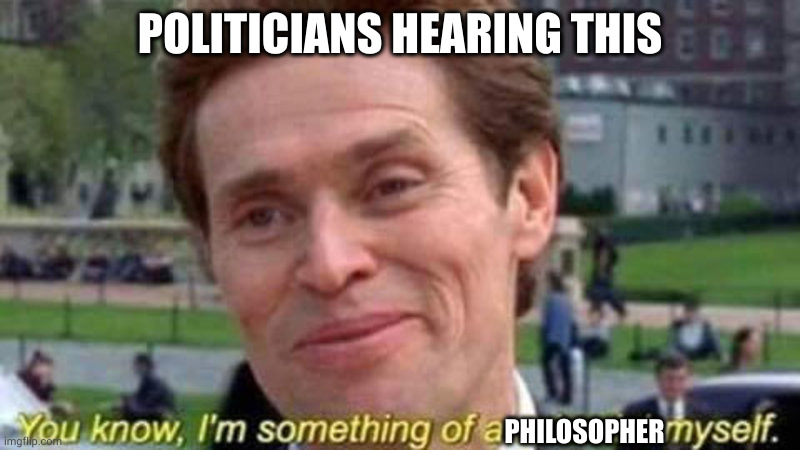Hover-over text of ExistentialComics’ comic:
Some people have called Plato the first totalitarian thinker, but if you look at what Democracy is producing these days it’s hard to not think he had a bit of a point…
And text beneath comic:
Also, my Dad is trying to raise some money for a surgery, I already posted this before and we met the goal, but then he contracted dengue fever so the surgury had to get delayed, so we are trying to raise a little more money to cover those expenses. If you could spare a few dollars it would really help.
As for Plato, he criticized democracy heavily, claiming that it gave people too much freedom, and if anyone could be elected by the ignorant masses, it would be too possible for selfish people who only wanted power and wealth to get into power. Democracy, ironically, would inevitably lead to tyranny and demagogues. He thought a better system would be for the wisest, most virtuous, and most selfless people to govern society, which of course would be philosophers like himself. How this system was immune to corruption is a little unclear to me, but given what’s going on with democracies lately you can probably at least say he has some good points.
Greece had democracy too, and it ran into the exact same basket of problems we experience today.
Candidates would smear each other through rumor campaigns, foreigners would be scapegoated for domestic problems, religious organizations would lobby for special privileges by promising their constituents’ support during election season, wealthy men would bribe whomever won to guarantee them favorable treatment, and large portions of the population were disenfranchised in order to maintain a patriarchal nationalist system built on the back of slave labor.
Consequentially, people lost faith in democracy as a mechanism for selecting popular rulers and became increasingly enamored with the military as a source of domestic income, social advancement, and national pride. The Greek system ultimately failed in the face of oligarchy during the Peloponnesian Wars, reemerged in a reformed state for almost a century, and then collapsed entirely following the conquest of the Macedonians.
Plato’s idealism not withstanding, his criticism is worth reading because it demonstrates a repeated pattern of human behaviors that modern political groups can learn from and respond to.
I would vote for buff Plato. His abs have the ideal form.
He is a stacked Pluto
Diogenes would have been a great king of the universe, specifically because he wouldn’t have wanted the part.
Casually laying out biblical punishment after insulting some hypocrisy or another. In want that God
Instead of fighting wars he’d just jack off on the other nation’s king
“Democracy is the worst system of government, except for all the others”
I still can’t find a way to disprove this statement. Popular vote inherently favors the majority as opposed to minorities and only cares about charisma. And yet, nothing else seems to beat it.
The only one I could think of is putting in a guy/AI that’s really benevolent and competent this time guys I pinky swear.
You forgot the most important part of that quote (that’s not actually a quote).
what about consensus systems? instead of going for a majority, u discuss different solutions until everyone is satisfied or at least ok with the proposed plan
Kinda what congress is right now because of filibusters; and like congress they would be paralyzed and ineffective once there’s some polarity.
i mean, good point. so what if u have a vote to kick someone for stalling or filibustering?
I could see an AI being up to the task. At least with such an artificial system, you can hard-code guardrails and a constitution that a parliament can agree upon.
Of course, I wouldn’t want current LLM-based AI anywhere near the reigns of power. Such a system would need to have proven itself secure and incorruptible over decades before we put it in power.
I could see an AI being up to the task.
There are no such things as AIs, but other than that, sure!
At least with such an artificial system, you can hard-code guardrails and a constitution that a parliament can agree upon.
You can bake in biases that you don’t even know are biases, which hands power to a certain group, and then that group refuses to fix the “AI” because doing so would reduce their power.
I don’t think anybody who works with computers would suggest that a computer be put in charge. It seems mostly to be the idea from people who only look at computers from afar and see them as these logical, unbiased oracles, which they’re not.
I’m still rooting for benevolent aliens stepping in, telling humanity it’s not capable of self care, and forcing us to clean up the planet so we can live on it as a wildlife preserve.
But how are the aliens governed?
In my fantasy, they’re Star Trek style space communists as they’re more than intelligent enough to make rational decisions.

Nayib Bukele, current president of El Salvador, describes himself as a philosopher king on his Twitter/X account.
Nope. Platos system had the philosophers owning nothing. Our politicians would hate it
Funny enough, the original Greek meaning of “idiot” was not a dumb person, but a “private” person who keeps to themselves and refuses to take part in politics. So, this usage is correct.
Fun fact this last panel is kinda wrong, Plato believed in Philosopher-kings/politicians who were the most educated, couldn’t even hold office until like 50 years old after 35+ educational years
I like the attention to detail that they did Plato as a beefcake.
I would love a source.
Anytime philosophers are arguing in a semi detailed way it’s prob existential comics
Well, this comic goes against what Plato wrote in the “Republic”. In it, Plato advocated for a city/country/polis which had three classes: the ruling class, the guardian class (military) and the ordinary folk. The ruling class would be made out of philosophers (multiple, so not just one or a few), but by “philosopher” it is meant someone who spent many decades studying philosophy since they were a child. I can’t remember the cut off age, but if someone were older than 13 or something like that, and they haven’t began their philosophical education (which, besides things we would traditionally consider philosophy, includes things like astronomy and mathematics), they weren’t eligible. So, by his own writing, Plato wouldn’t be fit for the ruling class.
Also, English didn’t even exist back then.
Thank you very much! Now to binge.
Removed by mod
Republican, to the core…
I’d vote for Diogenes, but I know he’d resent me for it
The really important part missing from the cartoon is that the philosopher kings were not allowed to own anything and all the wealth was to sit with workers. The idea is that those making decisions shouldn’t be in a position to personally benefit from it. It’s not a terrible idea
Not owning anything? Like Diogenes?
Well, no. Diogenes was a twat. Plato wasn’t expecting people to be idiots. His idea was that philosopher kings would have to live amongst the ordinary people of the state. They would be dependent on the good will of the governed.
Damn, Plato was ripped
Fun fact, when he was losing in a debate, he interrupted his opponent by flexing
In 1930s Germany an edition of The Republic was printed with a swastika on the cover.
They really liked what he had to say about an ethnicly superior society where the government controlled all commerce and decided what children could be exposed to in school.












